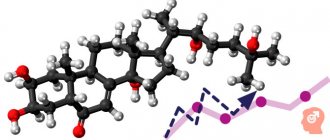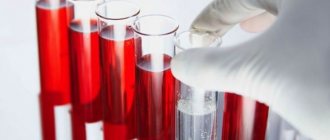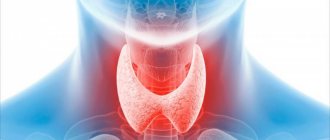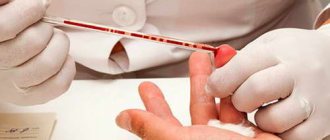Thyrotoxicosis
Hepatitis
Diabetes
52710 06 August
IMPORTANT!
The information in this section cannot be used for self-diagnosis and self-treatment.
In case of pain or other exacerbation of the disease, diagnostic tests should be prescribed only by the attending physician. To make a diagnosis and properly prescribe treatment, you should contact your doctor. We remind you that independent interpretation of the results is unacceptable; the information below is for reference only.
Glucose (in blood) (Glucose): indications for prescription, rules for preparing for the test, interpretation of results and normal indicators.
Indications for the purpose of the study
A blood glucose test is a routine biochemical test that is used to diagnose and control diabetes mellitus (types I and II, gestational diabetes (pregnant diabetes)) and other diseases associated with impaired carbohydrate metabolism.
Diabetes is a disease that belongs to the group of metabolic disorders of carbohydrate metabolism, which is based on a lack or low biological activity of the hormone insulin, which leads to an increase in blood glucose levels (hyperglycemia). Chronically elevated blood glucose levels can lead to serious health consequences.
Glucose levels are primarily affected by the hormone insulin, which is synthesized in the pancreas. In addition to insulin, the following are involved in maintaining carbohydrate balance: glucagon, a hormone also synthesized by the pancreas and acting as an insulin antagonist, hormones of the pituitary gland (somatotropin, thyrotropin), thyroid gland (T3 and T4) and adrenal glands (adrenaline and cortisol).
A doctor may order a blood glucose test if a patient has symptoms of hyper- or hypoglycemia.
Symptoms of high blood glucose (hyperglycemia) include:
- frequent urination;
- thirsty;
- blurred vision;
- fatigue;
- slow healing of wounds.
Symptoms of low blood glucose (hypoglycemia) include:
- anxiety;
- cardiopalmus;
- sweating;
- shiver;
- hunger;
- confusion.
A blood glucose test is necessary if you have risk factors for diabetes:
- excess body weight;
- sedentary lifestyle (hypodynamia);
- presence of diabetes mellitus in close relatives;
- high blood pressure;
- cardiac ischemia;
- chronic liver diseases;
- pregnancy.
Gestational diabetes
is a special form of diabetes that occurs only during pregnancy and is associated with hormonal changes.
Therefore, women who have been diagnosed with this pathology should monitor their blood glucose levels throughout pregnancy.
Symptoms and types of hypoglycemia
Hypoglycemia is characterized by various symptoms, the nature and severity of which depend on the individual patient and the cause of the pathology.
The main signs of this condition include obsessive hunger, increased sweating, nausea and vomiting, weakness, tremors in the limbs, rapid heartbeat, decreased concentration, drowsiness, visual disturbances (blurred vision, double vision and “gnats” in the eyes), panic and anxiety, paleness of the face.
There are three types of hypoglycemia based on severity:
- Mild (a person is able to independently help himself by consuming sweet drinks and sugar-containing foods).
- Moderate severity (the person remains conscious, but needs the help of third parties to normalize blood sugar levels).
- Severe (a hypoglycemic coma occurs, the person is unconscious and needs urgent hospitalization).
What may affect the results
Eating food, alcohol, certain medications, fatigue, or stress can affect your blood glucose levels.
Medicines that may cause increased blood glucose levels.
- Corticosteroid hormones (another name is glucocorticoids). They are intended to treat diseases caused by inflammation: rheumatoid arthritis, lupus, allergies. Systemic (tablet form, intravenous or intramuscular) steroids include hydrocortisone and prednisolone. However, topical steroids in creams and ointments or inhaled steroids (used to treat asthma) do not significantly affect glucose levels.
- Medications for anxiety, attention deficit disorder, depression and other mental health problems.
- Oral contraceptives (birth control pills).
- Some medications to normalize high blood pressure.
- Statins, used to lower cholesterol levels.
- Adrenaline (can be used for severe allergic reactions).
- High doses of non-inhaled asthma medications (given intravenously for severe attacks).
- Isotretinoin (used to treat acne and other dermatological conditions).
- Tacrolimus is an immunosuppressant (prescribed after organ transplantation).
- Some antiviral medications prescribed to patients with HIV and hepatitis C.
- Pseudoephedrine (a decongestant found in some cold and flu medications).
- Cough syrups (many contain sugar).
- Niacin (vitamin B3).
In addition to medications for the treatment of diabetes, the following medications and dietary supplements can reduce glucose levels:
- Aspirin.
- Aloe.
- Magnesium salicylate.
- Quinine.
To get the most reliable result, it is recommended to refrain from taking these medications until the test is taken, having agreed upon the timing of drug withdrawal with your doctor.
Female sex hormones also affect glucose levels, so a few days before your period, your glucose levels may be higher than on other days.
You can take a blood glucose test at the nearest INVITRO medical office.
A list of offices where biomaterial is accepted for laboratory research is presented in the “Addresses” section. Interpretation of study results contains information for the attending physician and is not a diagnosis. The information in this section should not be used for self-diagnosis or self-treatment. The doctor makes an accurate diagnosis using both the results of this examination and the necessary information from other sources: medical history, results of other examinations, etc.
How to protect yourself from diabetes
Prevention of the development of increased glucose production is quite simple. You need to follow a few tips:
- Lead an active lifestyle. If you have a sedentary job, take long walks in the evenings. Give up weekends spent on the couch watching TV. This is especially true for overweight people.
- Proper nutrition. Skip sweet baked goods in favor of whole grain ones. Add light protein foods to your diet, try not to eat foods with complex carbohydrates. Convenience foods and fatty foods are your main enemies.
- Avoid stress. Learn to protect yourself from factors leading to grief and worry. Learn to avoid negative emotions and don't allow yourself to get angry too often.
- Monitor your blood pressure closely. Frequent pressure changes lead to weakening of blood vessels and the entire body.
- Find out if you are predisposed to this disease in advance using DNA testing.
Blood glucose test
Glucose is an organic compound that is the main source of energy for the body's cells and the only one for the brain and nervous system. For the normal functioning of all organs and systems of the body, a relatively constant level of glucose must be maintained. During digestion, carbohydrate sources are broken down into glucose and other nutrients; they are absorbed by the small intestine and distributed throughout the body. The use of glucose for energy depends on insulin, which facilitates the transport of glucose into the body's cells and stimulates the liver to store excess energy as glycogen for storage.
Typically, blood glucose levels rise slightly after eating, and the pancreas responds by releasing insulin into the blood in an amount appropriate to the size and content of the meal. As glucose enters cells and is metabolized, blood levels drop and the pancreas responds by slowing and then stopping the release of insulin.
Decoding the result
Increased glucose levels (hyperglycemia)
Observed in the following diseases and conditions:
- Diabetes.
- Gestational diabetes (diabetes during pregnancy).
- Physiological hyperglycemia, causes: moderate physical activity, strong emotions, stress, smoking, adrenaline release after injection.
- Active infectious process.
- Trauma, recent surgery.
- Endocrine system diseases:
- a) pheochromocytoma - a tumor of the adrenal glands that produces adrenaline and is characterized primarily by a persistent increase in blood pressure; b) thyrotoxicosis – a pathological condition in which the thyroid gland begins to produce too many hormones (thyroxine and/or triiodothyronine); c) acromegaly is a disease associated with a violation of the synthetic activity of the pituitary gland (a gland located in the brain). It is characterized by excess production of growth hormone, leading to changes in facial features, enlargement of the hands and feet. d) gigantism - a pathology, also associated with the pituitary gland, is hereditary in nature, the first manifestations occur in early adolescence; e) Itsenko-Cushing syndrome is a condition in which the adrenal glands produce excessive amounts of cortisol. Characterized by a violation of carbohydrate metabolism; f) somatostatinoma - a tumor of hormonally active cells of the pancreas or cells located in the wall of the duodenum, secreting somatostatin; g) polycystic ovary syndrome - a symptom complex accompanied by the formation of cysts in the ovaries, menstrual irregularities, excess body weight, and infertility.
- Diseases of the pancreas (acute and chronic pancreatitis, pancreatitis with mumps, cystic fibrosis, hemochromatosis, pancreatic neoplasms).
- Chronic liver and kidney diseases.
- Cerebral hemorrhage, myocardial infarction.
- Taking thiazide diuretics, beta blockers, caffeine, oral contraceptives, glucocorticoids (a full list is presented in the section “What may affect the results”).
Low glucose levels (hypoglycemia)
- Patients with diabetes may experience low glucose levels in the following situations:
- a) insulin overdose; b) overdose of drugs that lower blood glucose levels; c) increased physical activity; d) skipping meals; d) drinking alcohol.
- Severe liver diseases (cirrhosis, hepatitis, carcinoma, hemochromatosis).
- Tumor diseases: pancreatic cancer, adrenal cancer, stomach cancer, fibrosarcoma.
- Reactive hypoglycemia is a condition in which blood glucose levels decrease 1-3 hours after eating.
- Dietary disorders (prolonged fasting, malabsorption syndrome - impaired absorption of nutrients due to intestinal diseases).
- Taking large doses of alcohol.
- Intense physical activity.
- Feverish conditions.
- Taking a number of medications:
- a) beta blockers (atenolol, propranolol, etc.) – used in the treatment of coronary heart disease, hypertension; b) flecainide and quinidine (drugs for arrhythmia); c) indomethacin (painkiller); d) insulin and other hypoglycemic drugs; e) some antibiotics, antifungal drugs; e) aspirin; g) a number of antiepileptic, anti-anxiety drugs (pregabalin); h) monoclonal antibodies for the treatment of tumor or autoimmune diseases.









